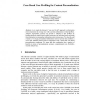Free Online Productivity Tools
i2Speak
i2Symbol
i2OCR
iTex2Img
iWeb2Print
iWeb2Shot
i2Type
iPdf2Split
iPdf2Merge
i2Bopomofo
i2Arabic
i2Style
i2Image
i2PDF
iLatex2Rtf
Sci2ools
116
click to vote
AH
2000
Springer
2000
Springer
Case-Based User Profiling for Content Personalisation
As it stands the Internet’s “one size fits all” approach to information retrieval presents the average user with a serious information overload problem. Adaptive hypermedia systems can provide a solution to this problem by learning about the implicit and explicit preferences of individual users and using this information to personalise information retrieval processes. We describe and evaluate a two-stage personalised information retrieval system that combines a server-side similarity-based retrieval component with a client-side case-based personalisation component. We argue that this combination has a number of benefits in terms of personalisation accuracy, computational cost, flexibility, security and privacy.
AH 2000 | Information Retrieval | Information Retrieval Processes | Internet Technology | One Size Fits All |
Related Content
| Added | 01 Aug 2010 |
| Updated | 01 Aug 2010 |
| Type | Conference |
| Year | 2000 |
| Where | AH |
| Authors | Keith Bradley, Rachael Rafter, Barry Smyth |
Comments (0)

